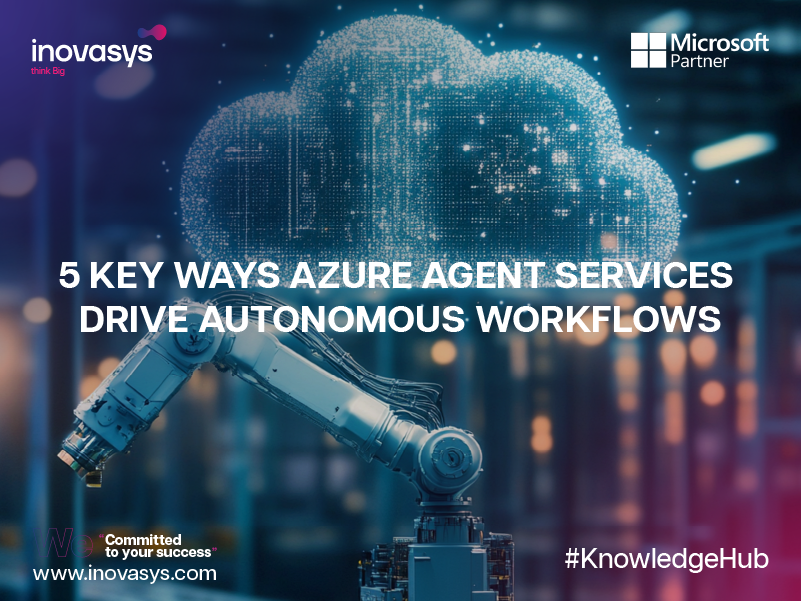Inovasys, founded in 2014, has been a leader in providing advanced technology solutions. By 2020, it became known as a service provider. The company aims to be the best partner for businesses looking to improve their operations with digital technology.
Articles & Press Release

5 Key Ways Azure Agent Services Drive Autonomous Workflows
Azure Agent Services are redefining digital transformation. By combining AI-driven automation and scalable autonomous workflows, Microsoft empowers businesses to streamline operations, cut costs, and unlock innovation faster than ever.
Over the past decade, cloud computing has transformed how companies operate. Now, with the rapid rise of artificial intelligence and automation, Azure Agent Services move beyond simple machine learning models or prebuilt apps. They introduce intelligent, autonomous workflows that learn, adapt, and integrate into complex business processes.
1. Automating Time-Consuming Business Tasks
Think of an Azure agent as a digital colleague—software capable of executing repeatable, time-consuming tasks on your behalf.
-
These agents are not simple rule-based scripts.
-
They are powered by advanced AI that provides flexibility and continuous learning.
Example:
Invoice processing traditionally involves manual review, data entry, validation, and approvals. With Azure Agent Services, this entire process can be automated end-to-end:
-
Agents read invoices and validate details against finance systems.
-
They flag anomalies and trigger payment workflows.
-
All actions adhere to strict compliance and security policies.
Humans remain in control while repetitive, error-prone tasks are handled automatically, saving time and reducing costs.
2. Built-In Governance and Compliance
Microsoft’s approach places a strong emphasis on governance and integration:
-
Autonomous systems must be trustworthy, auditable, and easy to manage.
-
Azure embeds built-in controls to ensure agents act within approved boundaries.
-
Every decision is fully trackable—vital in industries like finance, healthcare, and government.
These features help organizations maintain transparency and meet regulatory standards, which is crucial for building customer trust.
3. Massive Scalability
Azure offers a platform for deploying hundreds or thousands of agents that can work together:
-
Handle large-scale customer support by instantly resolving routine inquiries.
-
Automatically escalate complex cases to human staff when needed.
This scalability translates into faster service, lower operational costs, and happier customers, giving businesses a competitive edge.
4. Unlocking Human Creativity and Innovation
With automation comes responsibility:
-
Businesses must consider employee impact, retraining needs, and ethical AI practices.
-
History shows automation rarely replaces humans entirely.
Instead, it frees employees to focus on higher-value tasks such as:
-
Creative problem-solving
-
Strategic planning
-
Innovation and product development
By removing mundane tasks, Azure Agent Services enable teams to unlock creativity and drive growth.
5. The Future of Cloud: From Storage to Active Operations
In the coming years, autonomous workflows will become as common as email or online storage:
-
The cloud will not only store and process data, but also actively participate in business operations.
-
Organizations that adopt Azure agents early will stay ahead of competitors and build trust in their digital teammates.
Frequently Asked Questions (FAQs)
Q1: What are Azure Agent Services?
Azure Agent Services are AI-powered digital agents that automate tasks and integrate with business processes to create autonomous workflows.
Q2: How do autonomous workflows benefit businesses?
They reduce manual work, minimize errors, improve scalability, and free employees to focus on high-value strategic tasks.
Q3: Is Azure Agent Services secure for sensitive industries?
Yes. Microsoft provides built-in governance and compliance controls, ensuring agents operate within approved boundaries and every decision is fully auditable.
Q4: What is required to implement Azure Agent Services in an organization?
Companies typically need an existing Azure environment, clear process documentation, and collaboration between IT and business teams to design, deploy, and monitor the agents effectively.

